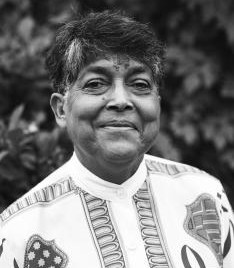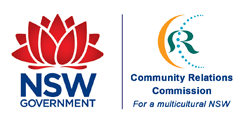 Nadege Michel |
Wajih Hijazi is 14 years old and migrated from Lebanon with his family in 2000. As part of 10 Stories from Bankstown, Bankstown City Council’s Community Harmony project, Wajih interviews Nadege Michel, a migrant from Mauritius who has lived in the local area for 24 years.
Which country do you come from?
I come from Mauritius. It’s close to Africa, but Mauritius is like a dot on the map. It’s not even as big as Tasmania. It’s a very nice country, island, about 30 miles from north to south and about 25 miles across. You can go around the island in one day.
It has beautiful beaches and the main crop is sugar. Lots of people work on the sugarcane plantations, and on the tea plantations as well.
What year did you migrate?
1970. In fact on the 10th of March this year, it has been 32 years because I still remember the date we disembarked here. We came by boat. There were planes.
But they were probably expensive in those days. Were they?
Yes. Also, we had lots to carry because we were migrating, so we were allowed boxes and containers of things that we wanted to bring along with us. The whole family migrated in a boat called Patris. It used to come from Greece, or from Europe, it comes to Mauritius, it picks up passengers and then goes on to Fremantle (Perth), Melbourne and then to Sydney. We arrived in Pyrmont (Sydney).
So when you were in the ship, when you first saw the land of Australia, how did you feel, what turned in your heart?
Well, I was surprised. I had a good trip, I wasn’t sick on the boat at all though my three children and my husband were seasick. When I looked around and I saw the greenery, the North Head, the Harbour Bridge, oh, I was thrilled! We saw some suburbs on the North Shore and we saw cars, cars, cars on the street. The streets were steep and you saw cars on both sides, and all the houses seemed to have red brick roofs. I said “Oh, can’t they change that colour!”. But I was impressed with what I saw, and I said “That’s the place (city) where we are going to live, and we are going to call it home”, and we did.
Do you speak French?
Yes. I’ve got a little bit of French blood, I may have a bit of Indian, or African, I don’t know… I’m a mixture. I call myself a pot pourri like the perfumes. They call us Creole.
So we’ve got Europeans still there (in Mauritius). We’ve got Chinese, Muslims, Indians, Creole. So I form part of the population because I am a mixture, I am Creole.
Why did you leave Mauritius? What were the problems there?
In 1968, the country became independent. That is, Mauritius didn’t belong to the Commonwealth anymore, and the Indians took over and asked for independence. Mauritius became an independent territory, an independent island. There were some conflicts, some civil, not war, but civil unrest, between the Indians, the Muslims and the Creole. Everyone felt threatened by the other.
Did you have any brothers or sisters here or any family members when you came?
My brother came with his family. He was a teacher in Mauritius. His wife was also a teacher, they have three sons. They decided to migrate in 1968 after Mauritius became independent. Then in 1969, my sister, her husband and five children migrated to Australia.
So you were the last one to come?
Yes. They wrote to us and said it’s the country where milk and honey flow. My brother explained to me that our children will have a better future and better prospects in Australia.
My husband and myself have 3 children, the eldest turned 15 on the ship, the second one was 14 and the daughter was 11. I was a school teacher back in my country and my husband owned a business, a small hardware shop. So when we thought about my brother and my sister here, and that they were doing well, we decided to come. So he sold his business and I resigned from my teaching position. I was given one year off on special leave.
Where did you first settle, which city?
In Sydney, Croydon Park. Then we moved here (Georges Hall in Sydney), we’ve been here 24 years. It was beautiful. Residential, beautiful. It was very quiet around here, in Georges Hall. When we bought this house it was eight years old so it was close to brand new.
My grandma migrated to Australia in the 80′s, and she talks about racist people in Australia. Did you experience racism?
Before we came in the 60′s, there was a Mauritian family that we knew who migrated to Australia, but they were looked down on so much that they went back to Mauritius.
At the time there was still a “White Australia” policy. A couple of years later, brothers and sisters of that family came to Australia and settled, they had no problem. So that brother who earlier went back to Mauritius came back to Australia with his family.
There was a little bit of racism, for example, when our boys went to school, they used to call them “wogs”. My boys are like their father and like me, we are dark skinned, and they were called “wogs”. But I can say I have never suffered from racism, people looking down on me. No, I have always been appreciated for who I am, for what I can offer. I have never suffered, but our children did.
When you first came to Australia did you work or did you stay at home?
No, I didn’t stay at home. I was a teacher in Mauritius.
(In Australia) I went to work in a kitchen as a kitchen hand, washing plates and dishes, peeling carrots and potatoes, but it was only for one month. In that period I rented a typewriter and I taught myself typing every evening.
At the time the Government would employ clerks to work in different departments, but I couldn’t get a job in a department unless I was a typist. After a couple of weeks when I got the speed up, I went for a test. I passed and they offered me jobs in various departments: Customs, Immigration, Police. I chose the Police Department. So a couple of months after we arrived in Australia, I went to the (NSW) Police Department and started to work there as a typist until 1974.
My brother was like an advisory counsellor to me. In 1974 he suggested I apply to a Commonwealth department. So I went and sat for the test and started in the Post Master General’s Department, then I worked with Telecom for seven years. After that, I joined Immigration for 12 or 13 years before I retired. I retired from Immigration as an Assessing Officer.
When you went back on holidays (to Mauritius) did you find any changes in the country?
Yes, lots of changes. They are improving. If I had stayed in Mauritius, today I wouldn’t be alive. I am a heart transplant recipient. Seven years ago, that is here, I developed heart problems, a heart condition, and I was checked by doctors at St Vincent’s Hospital.
They decided to help me survive and told me I needed a new heart, a transplant. So they operated on me, took out my old heart and gave me a new heart. Two years later I was sick again and they gave me a pacemaker. I’m on a lot of medication.
If I was in Mauritius I wouldn’t be alive because they don’t have those facilities, the medical advancements that we have here. They have hospitals in Mauritius but not the modern technology to perform a transplant. If someone has got problems with their heart, like blockage or whatever, they come to Australia for treatment. They have to pay. Fortunately I didn’t have to pay because I am an Australian Citizen. I had all my treatment free at St Vincent’s Hospital, and I still go there for treatment. So I can say that Mauritius is far behind Australia in this area. I am alive because of Australia. They have given me a chance and an extension of life.
Would you like to go back to Mauritius to live?
To visit only. I have cousins and friends there but my close family is here in Australia. My children and grandchildren are here, so that’s where I want to stay, and live. When I die, this is the place where my bones will be laid to rest. Australia is my home.
What would you do if you were walking down the street or in the shopping centre and a person comes to you and tells you to go back to your country?
I’ll say, “My country is here, I don’t have to go back anywhere. What are you talking about? You are foolish. This is my country and this is where I will stay”.
I don’t have to give them details where I come from and how many years I have been here. I would just tell them that I am an Australian. As they say, “A fair dinkum Aussie”.

